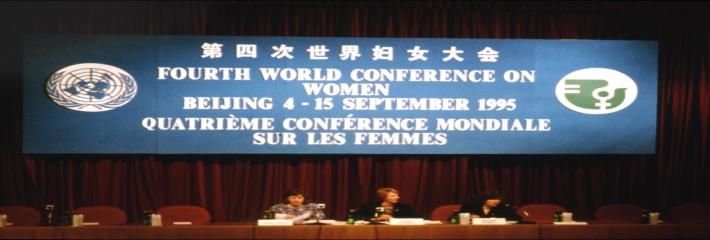Fourth World Conference on Women: Beijing, 1995

Fourth in a line of conferences aimed at improving the status of women worldwide (World Conference of the International Women’s Year – Mexico, 1975; World Conference of the United Nations Decade for Women: Equality, Development and Peace – Copenhagen,1980; World Conference to review and appraise the achievements of the United Nations Decade for Women: Equality, Development and Peace – Nairobi, 1985), the Beijing Conference differed from its predecessors in its focus. Rather than concentrating on women, it referred to gender, and called for a re-evaluation of society accounting for both women’s and men’s concerns. The term gender mainstreaming was introduced to indicate the process of restructuring social, economic and political institutions to include the issue of gender.
PREPARATIONS FOR THE CONFERENCE
In preparation for the Beijing Conference, ESCWA worked closely with the United Nations Development Fund for Women (UNIFEM, now incorporated in UN Women) to assist member States in their preparations for Beijing. ESCWA’s role included:
- Serving as the regional coordinator and the arm of the Secretariat in the region for all preparations;
- Encouraging member States to set up joint national committees including a multidisciplinary team with members from ministries, academics and non-governmental organizations (NGOs) in order to prepare for the Conference;
- Availing Arabic documents relating to the conference, including the questionnaire, jointly prepared by the five regional commissions, to support the preparation of national reports on progress achieved in implementation of the Nairobi Forward-Looking Strategies of 1985;
- Preparing an outline to guide the governments in their preparations of the national report and to standardize the coverage of these reports.
ESCWA also held several national workshops to examine the draft national reports prior to their submission to the Beijing Conference, and based on these national reports, it prepared the draft Arab Plan of Action for Advancement of Women to the Year 2005.
In November 1994, ESCWA organized, in collaboration with the League of Arab States, the Jordanian National Committee for Women and the Center of Arab Women for Training and Research (CAWTAR), the Regional Preparatory Meeting for the Beijing Conference which took place in Amman. The meeting was divided into two segments: an expert group meeting and a ministerial high-level meeting, with all Arab States invited to participate.
Later on, in July 1995, ESCWA organized in Beirut, in collaboration with UNIFEM and the National Lebanese Preparatory Committee for Beijing, a regional workshop to review the draft Beijing Platform for Action. The meeting focused on providing capacity-building on leadership, communications and negotiations skills to the official delegations in order to come to a common Arab position vis-à-vis the divisive issues in the draft Beijing Platform for Action.
THE CONFERENCE AND BEYOND
During the Beijing Conference, ESCWA and the League of Arab States held daily briefing meetings for the Arab Group and official delegations taking part in the Conference. They also co-organized with all other United Nations Regional Commissions a parallel event on the regional perspectives for the Advancement of Women. Dignitaries from all five geographical regions were invited as panelists. These included the previous four Secretaries-General of the Four World Conferences on Women, who happened to represent four of the five regional commissions.
As regional coordination agent, ESCWA efforts in the preparation for and follow-up to the Beijing Conference resulted in the adoption by the Council of Arab Ministers of Social Affairs of the League of Arab States in 1995 of the Arab Plan of Action for the Advancement of Women to the Year 2005.
A year after the Beijing Conference, ESCWA, again in collaboration with LAS and the Jordanian Ministry of Social Development, convened the First Arab Regional Meeting for Follow-up to Beijing, from 25 to 29 September 1996, in Amman. The Ministerial meeting adopted a Unified Arab Programme for Action for Women which focused on three socioeconomic and political priorities: poverty alleviation, the Arab family and political participation of Arab women. The Consolidated Arab Programme of Work, which was developed at the Arab Conference, was endorsed by the Council of Arab Ministers of Social Affairs in 1997.





